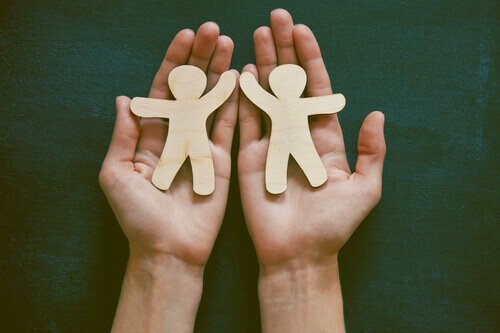
Philanthropy is about helping others selflessly. Without asking or requesting anything in exchange. Without waiting for any favors. It's unconditional, not-for-profit love. The word has a Greek origin and means "love of humanity". We can therefore understand that this altruistic feeling is not unique to a few wealthy people but to an attitude that can exist in any person.
Many famous people are ambassadors for social work and NGOs. They develop solidarity projects or build sanitary and educational facilities for the most disadvantaged children. Philanthropy is not just about the rich. It is not really a question of money but rather of generosity, willingness, attention and mercy.
Empathy transformed into charity
Philanthropy is a feeling based on honest will. It consists of carrying out social actions, donations or gifts that really help to improve the living conditions of others. And, as we said, without expecting any subsequent payments.
Contrary to what we may think, to help our neighbour, we need little. At the primary level, each of us can contribute, to a lesser extent, to a more just and equitable society. For example, with simple actions such as saving water, recycling garbage or giving away clothes, money or food. Everything has an impact on the strata of society that need it most. Drop after drop, oceans form.

Psychological Profile of Philanthropists
Professionals insist that there are two personal situations that increase the likelihood that one person will feel the need to empathize with and help the other. From these two circumstances, both types of philanthropic profiles develop.
A complicated emotional situation. In other words, the person becomes more generous because of psychological or psychological alterations that motivate them to act in a selfless manner. These difficulties are often the result of low self-esteem. In this way, the philanthropist seeks to feel better about himself/herself by reaching out to a charitable organization.
Empathy through affinity. These people are able to perceive and feel things like other people. They are those who are touched by the stories of their neighbors. They feel the pain of others as if it were their own and want to help them out of their sadness.
The awareness of being able to give
If we cannot give ourselves what we need, it is difficult for us to help others. It is therefore essential to know if we can help. On the other hand, if we have the necessary tools, the requisite capabilities and the moral strength to collaborate positively in a cause, we will be able to do so.
The raison d' être of philanthropy is a person's self-awareness. If we are not sure if we are going to improve the social balance, it is better not to intervene because we can do the opposite, by worsening the situation.
Good intentions are necessary. But we must also be able to count on the necessary means, on adequate preparation and on a group of professionals who are prepared for this.

What philanthropy is not
Many companies mistakenly define their social responsibility actions as corporate philanthropy. All companies have interests, mostly economic, and it is obvious that we cannot consider this as a selfless gesture. This concept is more in line with the so-called third sector. That is to say, the one who is governed by volunteerism and who is neither lucrative nor governmental.
We also find fake altruism. It is a form of self-interested goodness exercised from an authoritarian and discriminatory position. False altruism is based on a corrupt idea of superiority:"since I have more money or power than you, I am giving you a gift","thank me because without it, you would be nothing". Be careful because this has nothing to do with philanthropy. It is only a haughty, despotic and tyrannical attitude.
The controversy that affected the world's richest man, Microsoft owner Bill Gates, attracted particular attention. His policy of solidarity empathy challenged his philanthropy. Many people began to doubt his benevolent intentions and felt that his only goal was to improve the image of his company.
Charity is not necessarily synonymous with philanthropy and not all philanthropic acts are charitable. The difference is that charity seeks relief while philanthropy tries to solve social problems definitively.
"Give a man a fish and he'll eat it today. Give him a fishing rod and teach him to fish and he'll eat for the rest of his life."
-Chinese proverb-

Misanthropy, the preliminary stage?
The opposite of philanthropy is misanthropy. This is the tendency to feel apathy for everything that surrounds the human being. Misanthropists do not only feel rejection towards one or more people but for the whole human species. Their aversion is universal, they feel hatred for everyone.
Still, some see this as the stage before philanthropy. This idea is based on the conviction that in order to be able to help others, it is absolutely necessary to recognize the injustices of the world, as well as the humanitarian incapacity of people. That is to say, there are other beings who do not seek good and who, even in trying to help, only do evil.
Therefore, it is only by being aware of the selfishness of others and greed that we can achieve a true commitment to society and fight inequality.